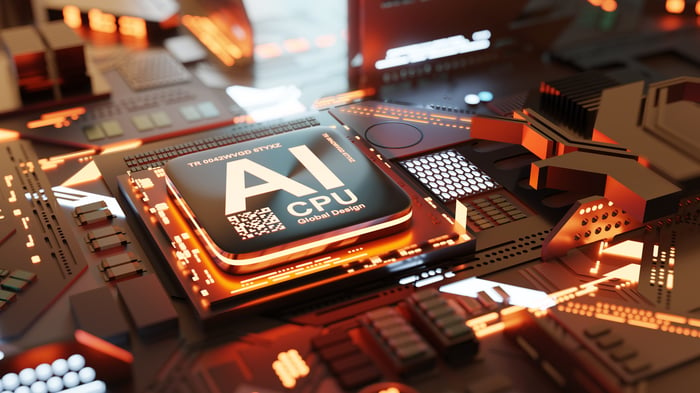This year began in stark contrast to its dubious predecessor. While the S&P 500 slumped 19% in 2022, it has gained 18% year to date and is now just 6% below its all-time high (as of this writing).
Arguably the biggest catalyst fueling the market ascent this year has been rapid advances in the field of artificial intelligence (AI), and more specifically the advent of generative AI. The ability of these advanced algorithms to create new content, summarize data, and automate tasks -- and the resulting productivity gains it promises -- has taken the world by storm. Furthermore, estimates regarding the economic impact are eye-catching, often amounting to trillions of dollars, there for the taking.
Investors have been enticed by the potential windfall wrought by AI, buying up shares of any company that throws its hat in the AI ring. One of the biggest beneficiaries of the trend has been C3.ai (AI 3.02%) -- which certainly wouldn't be easy to forget when it comes to AI -- particularly given its telltale ticker. Yet as intriguing as the opportunity is, investors might profit by looking at another AI stock that offers much more compelling potential.

Image source: Getty Images.
The case for -- and against -- C3.ai
Given its name and ticker symbol, it's reasonable that investors might consider C3.ai an obvious choice in the broader AI landscape. According to management, the company offers "over 40 turnkey enterprise AI applications that meet the business-critical needs of global enterprises," serving a number of industry verticals. The implication is clear, particularly given how quickly businesses are pivoting to adopt AI.
Like many companies in the field, demand for C3.ai stock has been through the roof, surging over 160% so far this year. At first glance, it seems pretty straightforward, but a review of the company's business performance reveals the challenges that lurk just below the surface.
C3.ai's recent financial results help tell the tale. During its fiscal 2024 first quarter (ended July 31), C3.ai delivered revenue of $72.4 million, up just 11% year over year and resulting in a loss per share of $0.56, a slight improvement from the $0.67 loss it generated in the year-ago quarter. Perhaps even more concerning is that C3.ai continues to burn cash with negative free cash flow of $8.9 million.
The news isn't all bad. Just this week, the company announced an expanded collaboration with Amazon Web Services to offer its suite of generative AI tools to Amazon's cloud users.
Yet, given the rapid adoption of AI, it would be reasonable to assume C3.ai would have much more to show for its efforts. Unfortunately, the company's outlook doesn't provide much in the way of good news for its shareholders. For the second quarter, management is guiding for 19% revenue growth and just 15% for the full fiscal year while its losses continue to mount. Despite lukewarm results and a tepid outlook, the stock still sells for 12 times sales with no suggestion of profits on the horizon.
In a time of unprecedented demand for AI, it's clear the company should be reaping the rewards of the market from which it took its name. Given the evidence, investors would be forgiven for "forgetting" C3.ai and looking elsewhere to profit from this trend.
You can't spell AI without Nvidia
Many investors are quickly coming to the conclusion that when it comes to AI, Nvidia (NVDA 6.18%) might just be the quintessential way to play the field. The company made its fortunes pioneering the graphics processing units (GPUs) that render lifelike images in video games.
However, as work on AI systems began in earnest, scientists discovered that the parallel processing capability of GPUs -- that is, the ability to perform a multitude of mathematical calculations simultaneously -- was a natural fit for the sheer number-crunching necessary to train and run AI models. Nvidia leaned into this calling, packaging its lightning-fast processors with the complex software needed to run them. As a result, and with no real competition to speak of, Nvidia has essentially cornered the market for AI processing.
But don't take my word for it. Nvidia controls an estimated 95% of the market for processors used in machine learning, according to New Street Research (via CNBC). It's reasonable to assume the company will control a similarly dominant share of the generative AI market. If demand is any indication, that will likely be the case as there's currently a shortage of Nvidia AI chips, and companies in this space are scrambling to get their hands on its latest processors.
The proof is in the pudding. In its fiscal 2024 second quarter (ended July 30), Nvidia generated record revenue that grew 101% year over year to $13.5 billion, while earnings per share climbed 854% to $2.48. Management was clear that the surging demand was the result of AI.
For its fiscal 2024 third quarter, Nvidia is forecasting all-time high revenue of roughly $16 billion, representing growth of 317% year over year and 18% sequentially. While part of this is the result of easy comps due to downturn-related challenges, it's impressive nonetheless.
To be clear, the stock is by no means cheap, selling for 45 times forward earnings and 15 times forward sales. But considering Nvidia's triple-digit growth and forecast for more of the same, I'd argue the stock is worth every penny -- and a superior AI investment compared to C3.ai.





